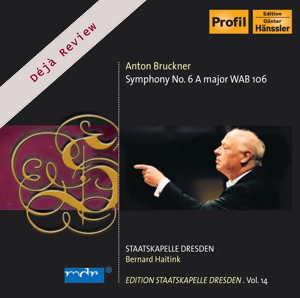
Déjà Review: this review was first published in August 2007 and the recording is still available.
Anton Bruckner (1824-1896)
Symphony No. 6 in A (1879-1881)
Staatskapelle Dresden/Bernard Haitink
rec. live, 2 November 2003, Semperoper, Dresden, Germany
Profil PH07011 [57]
This is the 14th volume of the Edition Staatskapelle Dresden. It’s a mid-price release of a live performance made during the middle of Bernard Haitink’s three year tenure as principal conductor. He made his name as a Brucknerian with the Amsterdam Concertgebouw, recording a complete series in the studio with them for Philips in the 1960s and 1970s and then re-recording Nos. 7-9. As can be seen from a search of this useful Bruckner discography, he then recorded Nos. 3-5 and 8 in the studio with Vienna Philharmonic Orchestra between 1985 and 1995. He has also made various other, mostly live, Bruckner recordings, none of which I have heard.
Unlike Karajan, whose Bruckner interpretations stood still over decades, Haitink’s seemed to move on, generally becoming slower and more expressive. This conductor also has a reputation of being better heard live – particularly in Mahler – and so it was with such pre-conceptions that I approached this disc. I have re-listened to Haitink’s Amsterdam recording from 1970 by way of comparison. This is currently available in the complete set and also on a Philips Duo coupled with the seventh symphony (review). When John Quinn and I collaborated on a review of all the Bruckner symphony recordings we had heard in 2005, Haitink’s Amsterdam Sixth was pretty much at the top of the pile for a work that has proved rather elusive on disc.
The preconceptions mentioned above are only partially borne out by listening to this disc. Haitink’s tempi are slightly broader, except in the Adagio which is identically paced. Overall, his conception of this work hasn’t changed a great deal. For a one-off live performance the playing of the Staatskapelle Dresden is quite exceptional. Haitink’s virtues as a Brucknerian are evident – architectural strength, seamless transitions and faultless balances between the sections of the orchestra. Phrasing is now slightly more expressive but there is never any sense of the music being pulled around. Haitink makes rather more of some markings in the score – for example the molto ritard. in the last three bars of the first movement.
The recorded sound is very decent and hardly betrays its live origins. Applause is retained but there is at least a three second gap following the last chord before it begins. Can someone please teach British audiences how to silently count to three before applauding? The documentation is excellent and it is hard to find fault with anything. To my mind, this is clearly superior to Haitink’s 1970 version both as a reading and in terms of sound quality.
Looking for a mid-price Bruckner 6 in modern sound? Look no further.
Patrick C Waller
Buying this recording via a link below generates revenue for MWI, which helps the site remain free.



















